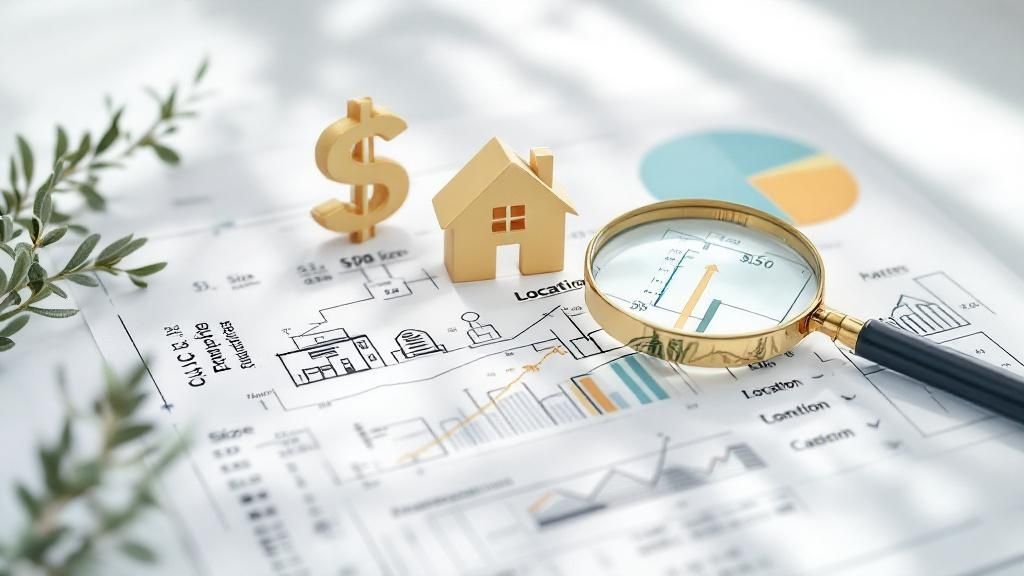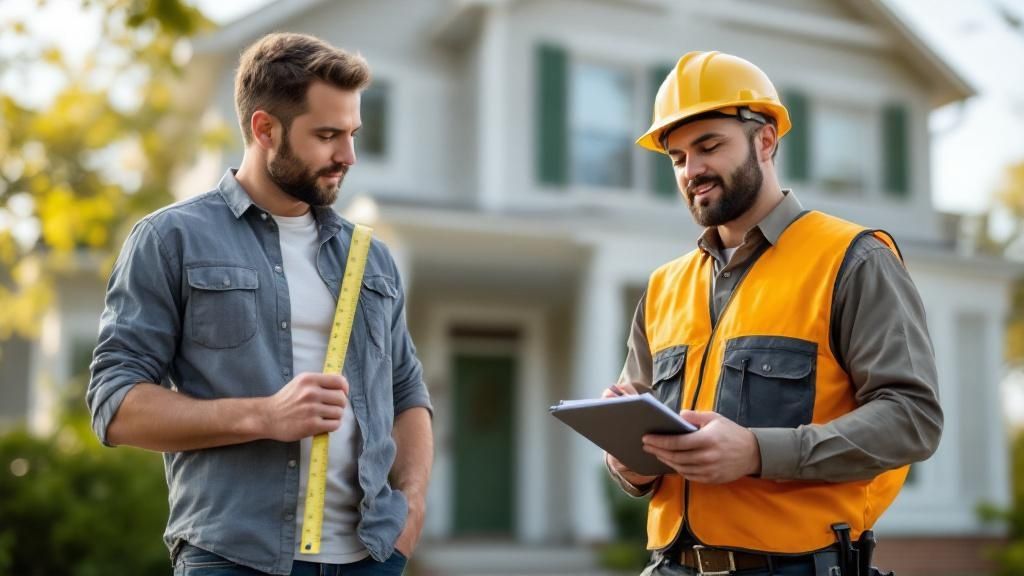What is the real house appraisals cost in BC? Our guide breaks down fees in Vancouver and the Fraser Valley, what factors to consider, and how to prepare.
READ MORE
So, how much does a house appraisal actually cost? For a typical residential property in Vancouver and across the Fraser Valley, you should budget somewhere between $400 and $700. This range is a solid baseline and covers most standard appraisals needed for mortgage financing or refinancing.
Before diving into the specifics, it's helpful to understand what you're paying for. Think of an appraisal not as a cost, but as an investment in a professional, unbiased valuation of your property. This isn't just some arbitrary number; it’s a critical piece of the puzzle that lenders use to approve mortgages and that homeowners rely on for massive financial decisions.
Across Canada, a standard appraisal for mortgage purposes usually lands in the $350 to $550 range. However, here in BC, especially in the high-value markets of Metro Vancouver and the Fraser Valley, things can get more complex. If you have a unique, rural, or particularly large property that requires more travel and research time from the appraiser, that fee can easily push past $1,000. The final price always comes down to the specifics of the job.
You can find more great insights into the valuation process directly from the Appraisal Institute of Canada.
To give you a clearer picture of what to expect, here’s a quick breakdown of the typical costs for different appraisal services you might encounter in our local market.
The table below offers a general guide to help you budget. It compares the most common types of appraisals and their typical price points for a standard home.
Keep in mind, this is just a starting point. The true house appraisals cost can and will vary. As we're about to explore, factors like your property's size, its exact location, and how quickly you need the report all play a big part in the final quote you'll receive.
So, what exactly is a house appraisal? It’s easy to get bogged down in technical terms, but think of it this way: an appraisal is a professional's expert opinion on your home's financial story. The appraiser acts as an impartial detective, analyzing your property to determine its Fair Market Value at a very specific moment in time.

This valuation isn’t just a number on a page; it's critical for major financial moves like securing a mortgage, refinancing, or setting the right price for a sale. Lenders across Vancouver and the Fraser Valley, in particular, depend on this independent assessment to make sure the property is actually worth the amount they're lending.
People mix these two up all the time, but it's vital to know the difference. An appraisal and a home inspection serve completely different purposes—they're two distinct chapters in your property's story.
A Home Inspector is like a doctor for your house. Their job is to perform a thorough check-up, hunting for potential problems like a leaky roof, bad wiring, or foundation issues. Their final report is all about the physical health and safety of the home.
An Appraiser, on the other hand, is like a financial analyst for your property. They are focused squarely on its market worth. While they’ll certainly note the home's overall condition, their primary job is to pin down a dollar value based on what similar, nearby properties have recently sold for.
An appraisal gives you a snapshot of your home’s value, and its structural integrity is a big piece of that puzzle. If an appraiser spots significant problems, like a potential termite infestation, it can heavily impact the final valuation. Should that happen, understanding the cost of termite treatment suddenly becomes a very important next step for a homeowner.
An appraisal doesn't give you a pass or fail grade; it provides an objective, data-backed opinion of value. This number is what banks use to mitigate their risk and what helps set a realistic price when selling your home.
This is why an appraisal is a non-negotiable step in most real estate deals. While the house appraisals cost is a factor you need to budget for, its role in securing financing and informing your sale price makes it a crucial investment. It provides the financial clarity needed for some of life’s biggest decisions, giving you a clear, unbiased perspective on where your property stands in the market.
Ever wondered why there isn't a single, flat fee for a house appraisal? Think of it like hiring a specialist for a custom project. The final house appraisals cost isn't pulled from a price list; it's a direct reflection of the specific work involved, and several key variables shape the final quote, especially here in the dynamic markets of Vancouver and the Fraser Valley.

Understanding these factors helps explain why your neighbour’s appraisal fee might be completely different from yours. It all comes down to the time, effort, and expertise needed to deliver a rock-solid, defensible valuation for your unique property.
This is the most straightforward factor. A sprawling acreage in Langley with a main house, a barn, and a workshop will naturally command a higher fee than a standard three-bedroom townhouse in Surrey. The appraiser simply has more ground to cover, more structures to measure, and far more details to document.
Complexity plays a huge role, too. Is your home a typical model you see all over the neighbourhood, or is it a one-of-a-kind custom build with unique architectural features? The more unique the property, the deeper the research has to go.
An appraiser’s fee is directly tied to the time they invest. A unique property requires a deeper dive into market data, a more complex analysis of features, and a more detailed report to justify its value.
This isn't just an opinion; it's a core principle of the profession. An appraiser has to spend significantly more time finding and justifying comparable sales for a waterfront home in West Vancouver than for a home in a subdivision filled with similar models in Port Coquitlam. That extra work is directly reflected in the fee.
Where your home is located absolutely matters. A property in a well-populated Vancouver neighbourhood is generally easy for an appraiser to get to and will have plenty of recent, nearby sales to analyze. It's a relatively smooth process.
On the other hand, a remote property tucked away in the Fraser Valley might require significant travel time, which is often factored into the cost. If a home is on a challenging lot or is difficult to access, that can also add to the appraiser's time on-site, nudging the final price up. Sparse sales data in a rural area also means the appraiser has to cast a wider net and do more research to find relevant comparables.
The distinctiveness of your home is a major variable. Unique properties often increase the appraisal cost for a few key reasons:
While a formal appraisal is essential for financing and legal matters, getting a preliminary sense of your home's worth is a powerful first step. For a quick snapshot, consider starting with a free home evaluation to see where your property stands in today's market.
Not all appraisals are created equal, and knowing the difference is key to managing both your expectations and the final house appraisal cost. Think of it like a medical check-up: sometimes a quick blood pressure reading is all you need, but other times, a full physical is in order. Each serves a different purpose, and the same logic applies to valuing your home.
The specific method your lender or lawyer asks for will directly shape the amount of work involved—and, of course, the price you pay. For most homeowners in Vancouver and the Fraser Valley getting a mortgage or refinancing, the go-to choice is almost always the Full Appraisal.

A full appraisal is the most detailed and widely trusted valuation method out there, especially when you're securing a new mortgage or a major refinancing loan. It's the industry standard in Canada for a very good reason.
This process involves a licensed appraiser coming out to conduct a thorough, hands-on inspection of your property, both inside and out. They’ll measure the home, document its condition, note any recent upgrades or potential issues, and take plenty of photos. Once the on-site work is done, they head back to the office to dive deep into research, analyzing recent, comparable property sales—comps—in your immediate neighbourhood to arrive at a solid, defensible market value.
This hands-on, comprehensive approach provides the highest level of assurance for lenders, which is why it's the default for major financial transactions. It leaves very little to chance, ensuring the property is a sound investment for the loan amount.
It's the detailed, time-consuming nature of this report that places it at the higher end of the cost spectrum. The appraiser is investing significant time on-site and in complex research to produce a truly robust valuation.
While a full appraisal is the heavyweight champion, there are situations where a lighter, more streamlined approach is perfectly fine. As you might expect, these alternatives are typically faster and less expensive.
To give you a clearer picture, here’s a breakdown of how these methods stack up.
Ultimately, the type of report required by a lender or court is what dictates the scope of work and the final fee. A more detailed and comprehensive analysis will always command a higher cost.
For those just starting their journey, our guide on buying a home can help shed light on many of these initial steps. In the end, your lender is the one who decides which appraisal type is needed to protect their investment, which means a cheaper option isn't always on the table.
Getting ready for a house appraisal isn't about frantically staging your home like you would for an open house or trying to pull a fast one to inflate its value. It's much simpler than that. Think of it as clearing the way for the appraiser to see your property’s true, unobstructed worth.
Your main goal is to make their job as straightforward as possible. A little bit of prep work can prevent delays, answer questions before they're even asked, and help the appraiser build a complete, accurate picture of your home. A tidy, well-maintained property makes a powerful first impression, suggesting it’s been cared for over the years. This isn’t about hiding flaws; it’s about presenting your home in its best light.
One of the smartest things you can do is put together a simple information package for the appraiser. They have no way of knowing about that high-efficiency furnace you installed last winter or the new roof from two years ago unless you tell them.
Jot down a list of any significant upgrades and renovations you’ve completed. For each one, make sure you include:
This documentation gives the appraiser solid data to back up a higher valuation. It’s like handing them a cheat sheet that points out all your home's best features and recent improvements. Understanding what truly adds value is a great first step, and for more ideas, you might find these tips to increase property value helpful.
Before the appraiser shows up, take a walk through your home and look for any small but obvious issues. These are the little things that, when added up, can paint a picture of neglect.
A dripping faucet, a door that sticks, or a cracked window pane might seem like no big deal, but to an appraiser, they can signal deferred maintenance. Fixing these minor items shows pride of ownership and good upkeep.
It’s also critical to make sure every part of your property is easy to get to. An appraiser needs to see every room, closet, crawl space, and outbuilding. If a room is packed with boxes or the attic hatch is blocked, they can't do a full assessment. This could lead to delays or even a less accurate valuation. Clear the pathways and make sure everything is unlocked.
Thinking ahead about these details can also help you understand your financial picture better. Once you have an accurate valuation, using a mortgage payment calculator can show you exactly how your home's value translates into monthly payments.
Getting your appraisal report can feel like you've just been handed a complex legal document, full of industry jargon and confusing tables. But it’s not as intimidating as it looks. Once you know how to read it, you'll see it tells a clear story about your home's value. Think of it as the appraiser showing their work, justifying their final number with solid evidence from the local market.

Naturally, your eyes will dart straight to the final valuation—the big number. But the real meat of the report is in the sections that explain how the appraiser got there.
The most critical part of any Canadian appraisal report is the "Sales Comparison Approach." This is where the magic happens. Here, the appraiser lays out the comparable properties, or "comps," they used to determine your home’s value. These are typically three to five similar homes in your neighbourhood that have sold recently.
You'll usually find a grid comparing your property to these comps, breaking down key features like:
The appraiser then makes adjustments to the sale prices of the comps to level the playing field. For example, if a comp sold for $950,000 but has a brand-new kitchen and yours is original, they'll make a negative adjustment to its sale price to better align it with your property’s features.
One of the biggest fears for homeowners in the Fraser Valley is getting an appraisal that comes in lower than expected. If this happens, don't panic. Your first move should be to comb through the report for any factual errors—a mistake in the square footage, a missed renovation, or a comparable property that isn't truly comparable.
If you find a clear error, you can formally submit a "Reconsideration of Value" request to the lender who ordered the appraisal. This isn’t just a complaint; you need to provide hard evidence to back up your claim. This could include municipal property records showing the correct dimensions or details of a recent comparable sale the appraiser overlooked.
While there's no guarantee of a successful appeal, a well-documented case can definitely lead to a revised valuation. For more tips on local real estate and homeowner topics, you can explore our news and articles section. The entire appraisal process, from the inspection to the final report, is a crucial part of the overall house appraisals cost, designed to deliver a fair and data-driven outcome.
When you're navigating a real estate transaction in Vancouver or the Fraser Valley, questions about the appraisal process are bound to come up. Let's tackle some of the most common ones with clear, straightforward answers.
In nearly every situation, the borrower is the one who pays for the appraisal. This holds true whether you’re buying a home or refinancing the one you already own in British Columbia.
Typically, you'll pay this fee upfront, either to your lender or to the appraisal management company they hire to handle the logistics. While it comes out of your pocket, remember that the appraisal is ultimately for the lender's protection—it’s their way of confirming the property is worth the amount of money they’re lending you.
Most lenders in British Columbia will accept an appraisal for about 90 to 120 days. In a fast-paced market like the Lower Mainland, where the Real Estate Board of Greater Vancouver (REBGV) reports on market shifts monthly, property values can change in the blink of an eye.
If there’s a delay and your financing takes longer than this window to close, don't be surprised if your lender requests an updated report or a "recertification of value." They just need to make sure the home's worth hasn't dropped since the original assessment.
Think of an appraisal as a snapshot in time—it captures a property's value on one specific day. Because the market is always moving, that snapshot has an expiry date to protect the lender from risk.
When you’re securing a mortgage, the short answer is no, you generally can't pick your own appraiser. To keep the process objective and avoid any potential conflicts of interest, Canadian lenders rely on an impartial, third-party system.
This usually means they work with an Appraisal Management Company (AMC) or maintain a roster of approved, independent professionals they assign on a rotating basis. This arm's-length approach is critical for ensuring the valuation is unbiased, which is a cornerstone of the entire house appraisals cost and its credibility.
Navigating the real estate market requires expert guidance. Whether you're buying, selling, or need property management services in the Fraser Valley, the team at Royal LePage Brookside Realty has the local knowledge to help you succeed. Learn more about our services at https://www.brookside-pm.ca.